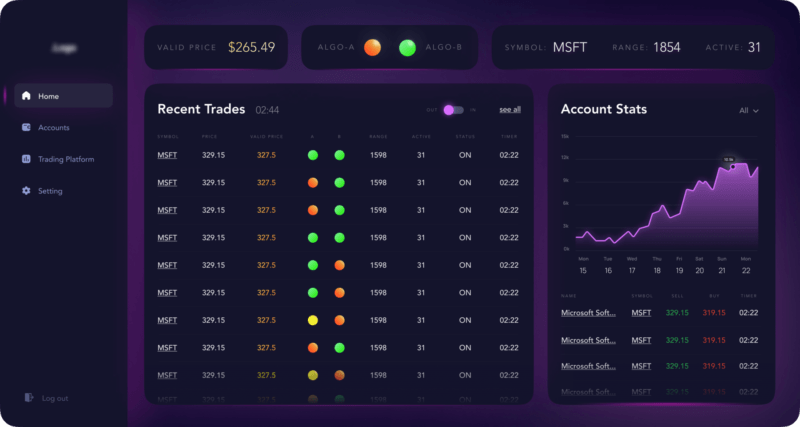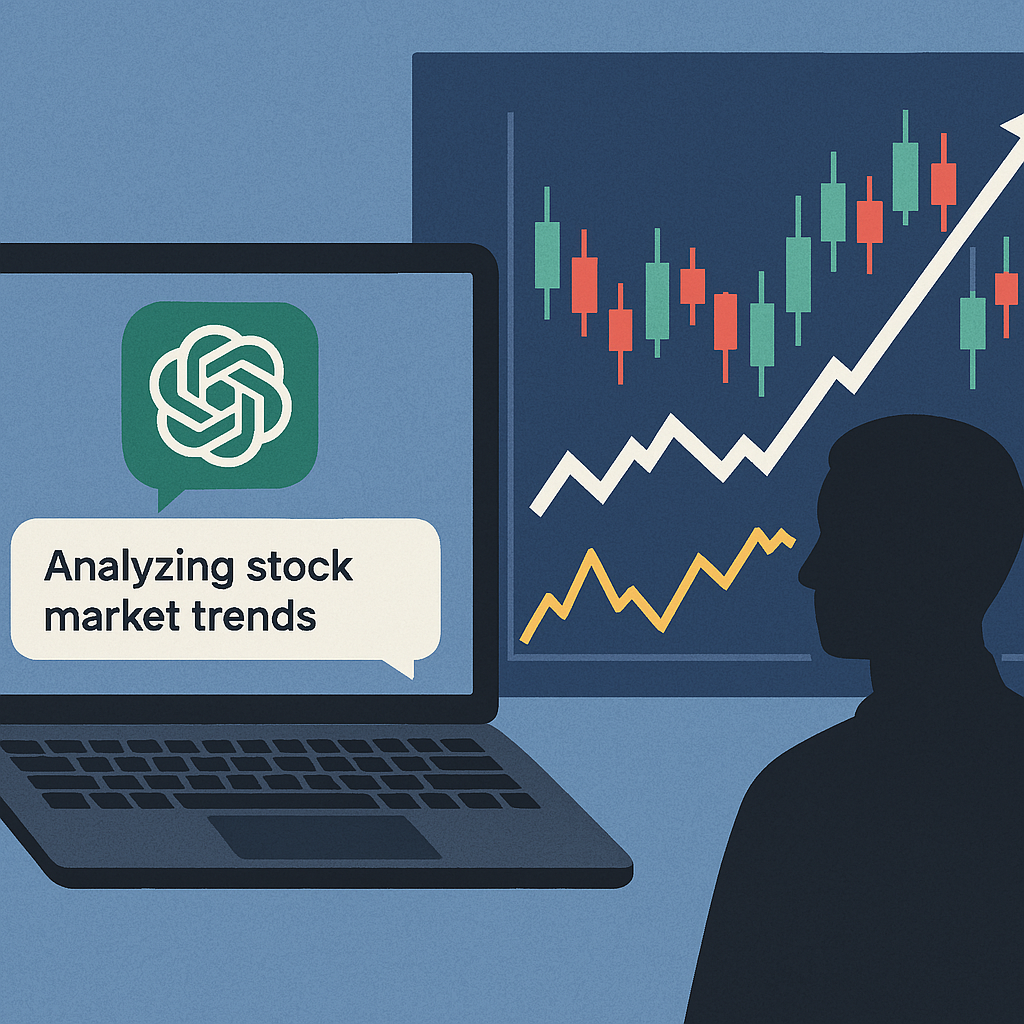
Intelligent investment assistant that performs technical analysis for a number of stocks, automatically tracks multiple indicators on stock exchanges, and generates buy/sell and risk signals for human traders.
With the rise of AI and language models like ChatGPT, the world of stock trading is starting to look very different. Many investors and traders are curious about whether ChatGPT can be a valuable tool in stock trading—whether it can analyze the market, provide real-time insights, or even predict stock price movements. So, what role can ChatGPT play in stock trading, and how can investors make the most of it?
Let’s explore how ChatGPT can assist traders, its advantages and limitations, and practical ways to incorporate it into a trading strategy.
Why Consider ChatGPT for Stock Trading?
ChatGPT, developed by OpenAI, is a sophisticated language model trained on a wide variety of text data. Although it’s not explicitly designed for stock trading, ChatGPT’s language-processing capabilities make it surprisingly useful for research, sentiment analysis, and data interpretation in trading. Here are some key reasons why traders are interested in using ChatGPT:
- Quick Market Analysis: ChatGPT can summarize lengthy financial reports, news articles, and stock analyses, helping traders gather insights faster.
- Sentiment Analysis: By analyzing news, social media, and financial articles, ChatGPT can gauge market sentiment—useful for anticipating short-term trends or identifying hype around specific stocks.
- Educational Insights: ChatGPT serves as a valuable tool for traders who want to learn about new strategies, understand market terminology, or get explanations on financial concepts.

How ChatGPT Can Be Used in Stock Trading
While ChatGPT cannot predict specific stock prices, it can support traders in various ways, offering insights and helping to refine strategies. Here’s how traders can use it effectively:
1. News Summarization and Sentiment Analysis
- ChatGPT can help summarize daily market news, allowing traders to quickly grasp key headlines and their impact on specific stocks.
- It can assess the tone of news articles, press releases, or social media posts to provide a sentiment summary—helpful for gauging the market’s attitude toward certain sectors or stocks.
2. Technical Analysis Insights
- While ChatGPT doesn’t directly analyze numerical data, it can explain technical indicators and chart patterns. For instance, traders can ask it to explain concepts like moving averages, RSI (Relative Strength Index), or candlestick patterns.
- By understanding these concepts through ChatGPT, traders can make informed decisions when using technical indicators to interpret stock charts.
3. Generating Trading Strategies
- ChatGPT can outline different trading strategies, such as momentum trading, swing trading, and value investing. Traders can ask it to explain the pros and cons of each strategy, helping them select one that aligns with their goals.
- For new or intermediate traders, ChatGPT can also suggest ways to diversify portfolios, manage risk, or use specific tools and indicators effectively.
4. Analyzing Earnings Reports and Financial Statements
- ChatGPT can simplify the analysis of complex financial documents, helping traders understand a company’s earnings report, cash flow, or revenue growth trends.
- By asking specific questions, traders can get an overview of a company’s financial health without going through pages of detailed figures and jargon.
5. Running Hypothetical Scenarios and Risk Management
- Although ChatGPT doesn’t provide real-time data, it can simulate hypothetical situations based on historical market behavior. For example, traders can ask how certain events (like interest rate hikes or a tech sector downturn) might impact specific stocks.
- It can also explain risk management techniques, such as position sizing, setting stop-loss orders, and diversification strategies, helping traders make risk-aware decisions.
Limitations of ChatGPT in Stock Trading
Despite its potential, there are notable limitations to using ChatGPT in stock trading. Here are a few things traders should be aware of:
| Limitation | Explanation |
|---|---|
| No Real-Time Data | ChatGPT lacks live market data and updates, making it unsuitable for real-time trades or day trading. |
| Lacks Numerical Analysis | ChatGPT isn’t a data analytics tool and doesn’t natively process or interpret raw market data like prices, volumes, or charts. |
| Generalized Predictions | The model provides general insights based on historical data, so it doesn’t offer specific predictions or signals for individual stocks. |
| No Autonomous Learning | ChatGPT can’t adapt or self-train based on new data. Its knowledge remains static until it’s retrained with updated information. |
These limitations mean ChatGPT is best used as a supplementary tool, not as a sole decision-maker in trading.
Practical Ways to Use ChatGPT in Your Trading Workflow
If you’re considering integrating ChatGPT into your trading routine, here’s a practical guide to maximize its benefits:
- Daily News Summaries: Ask ChatGPT to summarize major market news each morning. Focus on sectors or companies relevant to your portfolio, and use the sentiment summaries to identify areas of potential volatility or growth.
- Explain Trading Indicators: New to using moving averages or Fibonacci retracements? ChatGPT can clarify how these indicators work and provide examples of how they’re used in trading, giving you the background to interpret your trading platform’s tools more confidently.
- Generate Trading Ideas: Ask ChatGPT to list common strategies for specific market conditions. For instance, if the market is trending, it can suggest momentum trading techniques. If the market is volatile, it might explain swing trading strategies or options for hedging against losses.
- Hypothetical Scenario Analysis: Test ChatGPT by asking questions like, “What might happen to tech stocks if interest rates rise?” or “How could an oil price spike affect airline stocks?” Although it won’t predict exact outcomes, it can offer context based on historical events.
- Risk Management Education: ChatGPT can outline risk management basics, such as setting stop-loss orders or diversifying a portfolio. Use it to refine your approach to mitigating risk, especially if you’re exploring advanced strategies.
Can ChatGPT Predict Stock Prices?
The short answer: not directly. Predicting stock prices requires real-time market data, sophisticated quantitative models, and often a combination of machine learning techniques that ChatGPT doesn’t use. While ChatGPT can explain concepts related to stock price movement and market sentiment, it isn’t designed to provide trading signals or price forecasts.
However, ChatGPT’s ability to process text-based information makes it valuable for qualitative insights and market sentiment analysis, which can support better decision-making.
Future Prospects: AI-Driven Trading Beyond ChatGPT
As AI continues to evolve, the future holds exciting potential for stock trading. Here’s what could be on the horizon:
- Integration with Real-Time Data: Future language models may incorporate live market data feeds, enabling them to provide more current analysis and respond to shifting market trends in real time.
- Hybrid Models Combining NLP and Quant Analysis: Merging ChatGPT-like models with quantitative tools could create a more comprehensive trading assistant. Such a tool could analyze sentiment while also crunching numbers for technical analysis, giving traders a balanced view of market trends.
- More Advanced Sentiment Analysis: With refined NLP capabilities, AI could identify nuanced changes in sentiment across social media, news outlets, and other sources, offering traders deeper insights into market mood and potential volatility.
- Customizable AI Models: Personalized AI models could adapt to individual trading styles, learning user preferences and trading patterns over time to offer customized insights and recommendations.
Conclusion
ChatGPT is not a magic bullet for stock trading, but it’s a powerful tool for supporting research, understanding market sentiment, and exploring trading strategies. While it can’t predict stock prices or make real-time trades, ChatGPT can serve as an intelligent companion for traders looking to make more informed decisions.
If you’re interested in incorporating AI into your trading workflow, think of ChatGPT as an educational and analytical resource. Use it to deepen your understanding of market concepts, gather quick news insights, and generate ideas. Just remember: in the volatile world of stock trading, no single tool can replace a comprehensive strategy, disciplined risk management, and diversified research. Happy trading!